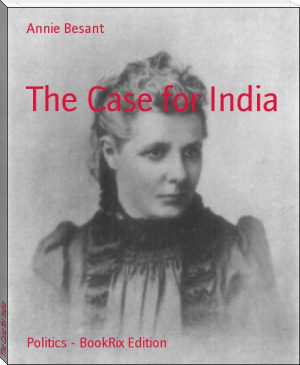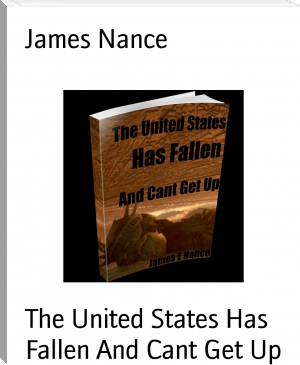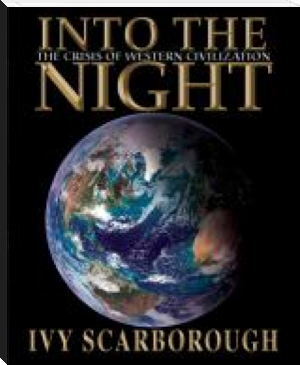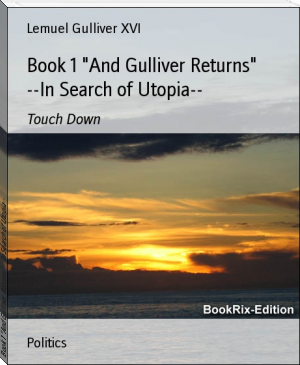The Case for India, Annie Besant [ebook smartphone TXT] 📗

- Author: Annie Besant
Book online «The Case for India, Annie Besant [ebook smartphone TXT] 📗». Author Annie Besant
Great Britain needs India as much as India needs England, for prosperity in Peace as well as for safety in War. Mr. Montagu has wisely said that "for equipment in War a Nation needs freedom in Peace." Therefore I say that, for both countries alike, the lesson of the War is Home Rule for India.
Let me close this part of my subject by laying at the feet of His Imperial Majesty the loving homage of the thousands here assembled, with the hope and belief that, ere long, we shall lay there the willing and grateful homage of a free Nation.
CHAPTER II.
CAUSES OF THE NEW SPIRIT IN INDIA.
Apart from the natural exchange of thought between East and West, the influence of English education, literature and ideals, the effect of travel in Europe, Japan and the United States of America, and other recognised causes for the changed outlook in India, there have been special forces at work during the last few years to arouse a New Spirit in India, and to alter her attitude of mind. These may be summed up as:
(a) The Awakening of Asia.
(b) Discussions abroad on Alien Rule and Imperial Reconstruction.
(c) Loss of Belief in the Superiority of the White Races.
(d) The Awakening of Indian Merchants.
(e) The Awakening of Indian Womanhood to claim its Ancient Position.
(f) The Awakening of the Masses.
Each of these causes has had its share in the splendid change of attitude in the Indian Nation, in the uprising of a spirit of pride of country, of independence, of self-reliance, of dignity, of self-respect. The War has quickened the rate of evolution of the world, and no country has experienced the quickening more than our Motherland.
THE AWAKENING OF ASIA.
In a conversation I had with Lord Minto, soon after his arrival as Viceroy, he discussed the so-called "unrest in India," and recognised it as the inevitable result of English Education, of English Ideals of Democracy, of the Japanese victory over Russia, and of the changing conditions in the outer world. I was therefore not surprised to read his remark that he recognised, "frankly and publicly, that new aspirations were stirring in the hearts of the people, that they were part of a larger movement common to the whole East, and that it was necessary to satisfy them to a reasonable extent by giving them a larger share in the administration."
But the present movement in India will be very poorly understood if it be regarded only in connexion with the movement in the East. The awakening of Asia is part of a world-movement, which has been quickened into marvellous rapidity by the world-war. The world-movement is towards Democracy, and for the West dates from the breaking away of the American Colonies from Great Britain, consummated in 1776, and its sequel in the French Revolution of 1789. Needless to say that its root was in the growth of modern science, undermining the fabric of intellectual servitude, in the work of the Encyclopaedists, and in that of Jean-Jacques Rousseau and of Thomas Paine. In the East, the swift changes in Japan, the success of the Japanese Empire against Russia, the downfall of the Manchu dynasty in China and the establishment of a Chinese Republic, the efforts at improvement in Persia, hindered by the interference of Russia and Great Britain with their growing ambitions, and the creation of British and Russian "spheres of influence," depriving her of her just liberty, and now the Russian Revolution and the probable rise of a Russian Republic in Europe and Asia, have all entirely changed the conditions before existing in India. Across Asia, beyond the Himalayas, stretch free and self-ruling Nations. India no longer sees as her Asian neighbours the huge domains of a Tsar and a Chinese despot, and compares her condition under British rule with those of their subject populations. British rule profited by the comparison, at least until 1905, when the great period of repression set in. But in future, unless India wins Self-Government, she will look enviously at her Self-Governing neighbours, and the contrast will intensify her unrest.
But even if she gains Home Rule, as I believe she will, her position in the Empire will imperatively demand that she shall be strong as well as free. She becomes not only a vulnerable point in the Empire, as the Asian Nations evolve their own ambitions and rivalries, but also a possession to be battled for. Mr. Laing once said: "India is the milch-cow of England," a Kamadhenu, in fact, a cow of plenty; and if that view should arise in Asia, the ownership of the milch-cow would become a matter of dispute, as of old between Vashishtha and Vishvamitra. Hence India must be capable of self-defence both by land and sea. There may be a struggle for the primacy of Asia, for supremacy in the Pacific, for the mastery of Australasia, to say nothing of the inevitable trade-struggles, in which Japan is already endangering Indian industry and Indian trade, while India is unable to protect herself.
In order to face these larger issues with equanimity, the Empire requires a contented, strong, self-dependent and armed India, able to hold her own and to aid the Dominions, especially Australia, with her small population and immense unoccupied and undefended area. India alone has the man-power which can effectively maintain the Empire in Asia, and it is a short-sighted, a criminally short-sighted, policy not to build up her strength as a Self-Governing State within the Commonwealth of Free Nations under the British Crown. The Englishmen in India talk loudly of their interests; what can this mere handful do to protect their interests against attack in the coming years? Only in a free and powerful India will they be safe. Those who read Japanese papers know how strongly, even during the War, they parade unchecked their pro-German sympathies, and how likely after the War is an alliance between these two ambitious and warlike Nations. Japan will come out of the War with her army and navy unweakened, and her trade immensely strengthened. Every consideration of sane statesmanship should lead Great Britain to trust India more than Japan, so that the British Empire in Asia may rest on the sure foundation of Indian loyalty, the loyalty of a free and contented people, rather than be dependent on the continued friendship of a possible future rival. For international friendships are governed by National interests, and are built on quicksands, not on rock.
Englishmen in India must give up the idea that English dominance is necessary for the protection of their interests, amounting, in 1915, to L365,399,000 sterling. They do not claim to dominate the United States of America, because they have invested there L688,078,000. They do not claim to dominate the Argentine Republic, because they have invested there L269,808,000. Why then should they claim to dominate India on the ground of their investment? Britons must give up the idea that India is a possession to be exploited for their own benefit, and must see her as a friend, an equal, a Self-Governing Dominion within the Empire, a Nation like themselves, a willing partner in the Empire, and not a dependent. The democratic movement in Japan, China and Russia in Asia has sympathetically affected India, and it is idle to pretend that it will cease to affect her.
DISCUSSIONS ABROAD ON ALIEN RULE AND IMPERIAL RECONSTRUCTION.
But there are other causes which have been working in India, consequent on the British attitude against autocracy and in defence of freedom in Europe, while her attitude to India has, until lately, been left in doubt. Therefore I spoke of a splendid opportunity lost. India at first believed whole-heartedly that Great Britain was fighting for the freedom of all Nationalities. Even now, Mr. Asquith declared--in his speech in the House of Commons reported here last October, on the peace resolution of Mr. Ramsay Macdonald--that "the Allies are fighting for nothing but freedom, and, an important addition--for nothing short of freedom." In his speech declaring that Britain would stand by France in her claim for the restoration of Alsace-Lorraine, he spoke of "the intolerable degradation of a foreign yoke." Is such a yoke less intolerable, less wounding to self-respect here, than in Alsace-Lorraine, where the rulers and the ruled are both of European blood, similar in religion and habits? As the War went on, India slowly and unwillingly came to realise that the hatred of autocracy was confined to autocracy in the West, and that the degradation was only regarded as intolerable for men of white races; that freedom was lavishly promised to all except to India; that new powers were to be given to the Dominions, but not to India. India was markedly left out of the speeches of statesmen dealing with the future of the Empire, and at last there was plain talk of the White Empire, the Empire of the Five Nations, and the "coloured races" were lumped together as the wards of the White Empire, doomed to an indefinite minority.
The peril was pressing; the menace unmistakable. The Reconstruction of the Empire was on the anvil; what was to be India's place therein? The Dominions were proclaimed as partners; was India to remain a Dependency? Mr. Bonar Law bade the Dominions strike while the iron was hot; was India to wait till it was cold? India saw her soldiers fighting for freedom in Flanders, in France, in Gallipoli, in Asia Minor, in China, in Africa; was she to have no share of the freedom for which she fought? At last she sprang to her feet and cried, in the words of one of her noblest sons: "Freedom is my birthright; and I want it." The words "Home Rule" became her Mantram. She claimed her place in the Empire.
Thus, while she continued to support, and even to increase, her army abroad, fighting for the Empire, and poured out her treasures as water for Hospital Ships, War Funds, Red Cross organisations, and the gigantic War Loan, a dawning fear oppressed her, lest, if she did not take order with her own household, success





Comments (0)